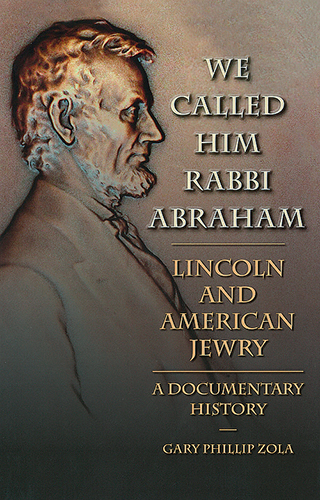
Jews have held many U.S. leaders in high esteem over the course of American history, but they maintain a particularly emotional bond with Abraham Lincoln. Dr. Gary Zola’s recently released book, We Called Him Rabbi Abraham: Lincoln and American Jewry, a Documentary History, sheds new light on that storied 19th-century relationship. From the time of Lincoln’s presidency to the present day, American Jews have persistently viewed “Honest Abe” as one of their own—casting him as a Jewish sojourner and, in certain respects, a Jewish role model.
“Everybody venerates Lincoln,” Zola, who is executive director of The Jacob Rader Marcus Center of the American Jewish Archives and a professor of the American Jewish experience at Hebrew Union College in Cincinnati, Ohio, told JNS.org. “He is beatified and becomes an icon all over the world. But I challenge anyone to identify an American hero, not a Jewish hero, who has been taken into the Jewish experience as if he were really one of us. There’s a difference between admiring an American hero and considering that American hero to be a Jewish role model.”
Published in March, Zola’s book is the first volume of annotated documents to focus on the history of Lincoln’s image, influence, and reputation among American Jews. What exactly is behind the former president’s special relationship with the Jewish community? For starters, his biblical name.
“The soldiers referred to him as ‘Father Abraham,’” Zola said. “He had the beard, and also Lincoln assumes this role as an emancipator of the slaves. He is in so many ways reminiscent of this part of our religious heritage that seems to work for both the Jews and the Americans. Lincoln had numerous significant encounters with the Jewish community during his day, and they were dramatic.”
The most prominent of those encounters, said Zola, was Lincoln’s revocation of General Grant’s Orders #11, which had ordered the expulsion of all Jews in his military district— including areas of Tennessee, Mississippi, and Kentucky—as part of a Union campaign against a black market in southern cotton, which Grant believed was run “mostly by Jews and other unprincipled traders.”
Dr. James Cornelius, curator of the Lincoln Collection at the Abraham Lincoln Presidential Library & Museum in Springfield, Ill., said Zola’s book “clearly assembles more material, in a more intelligible way, than any other book on the topic.”
Cornelius told JNS.org that Lincoln’s positive connections with Jews were “not surprising, since Lincoln is known to have treated nearly everyone he met with kindness and fairness.” One of Lincoln’s well-known Jewish connections, Cornelius noted, was his political and personal friendship with Abraham Jonas, a Whig/Republican organizer who in July 1860, during Lincoln’s presidential campaign, alerted Lincoln about rumors started by Democrats that he was an anti-immigrant “know-nothing.”
“Lincoln quickly wrote back [to Jonas] to deny [the rumors],” said Cornelius. Zola said Jonas was Lincoln’s most valued friend.
“Lincoln proves, through this relationship with Jonas, that he is capable of being a friend and an ally to like-minded people. It doesn’t matter to Lincoln that Jonas was a Jew,” said Zola.
In three chapters in Zola’s book—“Lincoln & the Chaplaincy Controversy,” “Lincoln & the Revocation of General Orders No. 11,” and “Lincoln & the Movement to Christianize the U.S. Constitution”—Zola provides documentation that shows Lincoln handled controversies with not only deference to Jewish people, but to all people.
Had Lincoln not been assassinated, Cornelius suggested, he likely would have extended to smaller minorities all the rights he had fought to win for African Americans. Everything about Lincoln’s thought and character suggests that he saw no differences between citizens of the U.S. or aspirants to citizenship, said Cornelius.
“Thus, votes for blacks once the war was won,” he said. “Perhaps eventually votes for women, though he had not addressed that topic since 1837.”
In the chapter titled “Lincoln & the Movement to Christianize the U.S. Constitution,” Zola writes that in the weeks following Lincoln’s assassination, many Jewish leaders pointedly described Lincoln as a man who was always ready to recognize “in full” American Jewry’s “claims to an equality before the law.”
“In eulogizing Lincoln, Philadelphia newspaper editor and Jewish communal leader Alfred T. Jones (1822–88) maintained that whenever the minority rights of American Jewry had been impugned, Lincoln ‘promptly recognized our claims as a religious body to national protection, and acceded unhesitatingly to all our just demands,’” Zola writes.
In his sixth chapter, Zola describes how David Einhorn (1809–79), a distinguished reformer and probably the nation’s most outspoken rabbinic opponent to slavery, elevated Lincoln to an almost saintly status.
“The ‘High Priest of Freedom’ had been murdered, Einhorn lamented. Lincoln, he euphuistically proclaimed, was ‘his people’s messiah.’ Einhorn literally described Lincoln’s death as a form of ’Kiddush Ha-Shem’—a technical expression in Judaism that refers specifically to the act of forfeiting one’s life for a sacred cause,” writes Zola.
Cornelius told JNS.org that he hears on a weekly basis “from people—many of them with religious interests—who try to embrace Lincoln more tightly than the next group.”
“Everyone wants Lincoln on their team,” he said. “For Jews, as a religious group, he is perhaps more attractive as one of our most interesting religious thinkers or personalities to occupy the White House: a natural humanist and egalitarian, whose utterances were not the dishwater that more often emerges from those ideological positions.”
Zola said that over the course of the last 150 years, “as Lincoln has helped Americanize Jews, Jews have consistently persistently Judaized Lincoln.”
“This is a unique phenomenon for any American figure, even to the degree that he appears in Jewish religious textbooks as a role model for how to be a good Jew,” he said.
By Robert Gluck/JNS.org










